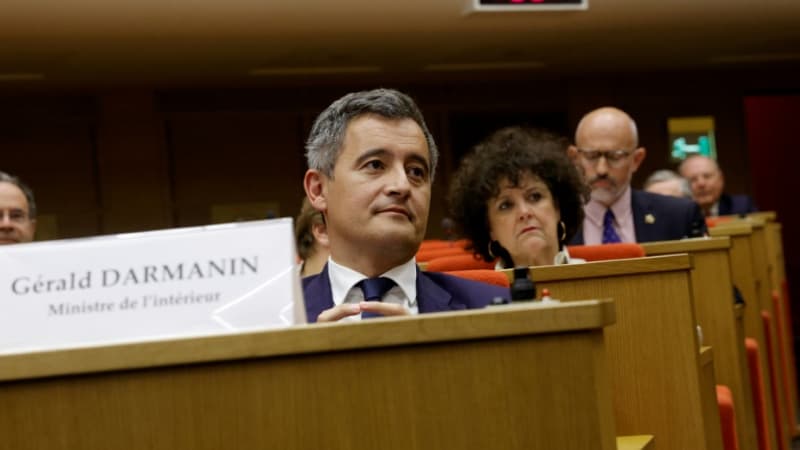First green light in the Assembly: the deputies of the Law Commission voted during the night from Friday to Saturday a revised version of the immigration bill, which takes up the toughest measures of the Senate, but with which the presidential field is still waiting win votes from the right.
“It is a great satisfaction. The government will continue to listen to convince,” the Minister of the Interior, Gérald Darmanin, immediately reacted to X.
The split LRs
After a week of examination, the text, which will reach the chamber starting December 11, was adopted shortly after 2:00 a.m. thanks to the votes of the presidential side and Liot’s deputies, and despite opposition from the left and of the RN.
The two LRs present were divided. Mansour Kamardine (Mayotte), who pushed through an amendment at the end of the session to toughen family reunification in his territory, supported the bill, unlike Annie Genevard (Doubs), who voted against it.
“The recount does not exist for us,” he reacted, considering that the text had “gone too far in its fundamentals with respect to the Senate version.”
The text returns to senatorial hardening
Among the most talked-about measures is the restoration of state medical aid (AME) for undocumented immigrants, which the Senate had replaced with emergency medical aid.
Regarding the experimentation of a system of regularization of undocumented immigrants in scarce, also emblematic, professions, the presidential side proposed “a compromise.”
The Senate provided for a procedure entirely in the hands of the prefect. The version adopted by the Assembly committee regulates the power of the latter, who could oppose the issuance of the title in case of threat to public order, non-compliance with the values of the Republic or polygamy.
The deputies once again addressed part of the senatorial toughening on family reunification, access to emergency housing or even the conditions of access to certain social benefits.
A reform of the National Asylum Court
But they also maintained several on the need to benefit from regular resources to access family reunification, the conditions for access to the title of “sick foreigner” or the requirements for learning the French language.
In committee, Gérald Darmanin did not fail to list to the LR deputies all the Senate additions retained in the text, highlighting the measures aimed at facilitating expulsions and reducing the processing times for asylum applications.
“It will be very difficult for you to explain that this is not what the French want,” he said.
On Friday, the deputies adopted in particular the lifting of several “protection” blockades, against the expulsion of foreigners in a legal situation who have committed certain crimes and serious misdemeanors, or against decisions that force them to leave French territory (OQTF) .
They also adopted a broad reform of the National Asylum Court (CNDA). The text aims to deconcentrate it through territorial chambers. Much to the dismay of the left, it also establishes the principle of single judge decision-making, reserving collegiality for cases considered complex, except in the case of minors.
“Double or quit”
The parliamentary left, united around this text, extensively attacked the promises made to the right. For the head of the PS deputies, Boris Vallaud, the Government shows “duplicity” by agreeing to review its regularization system.
For Elsa Faucillon (PCF), the compromises with the Senate “serve the ‘myth of the air call’.”
The RN strongly criticized a text that seemed too weak. On the part of LR, the group’s position was partially weakened by the publication of a forum of 17 deputies open to a vote on the text, if it retained enough elements from the Senate.
In committee, the group’s leaders once again took the offensive, insisting on “getting rid” of the senatorial version, in the words of the president of the LR group, Olivier Marleix. He brandishes the need for a constitutional reform that his group must defend in the chamber on December 7.
Beyond some right-wing voices, Beauvau hopes to be able to count on the independent group Liot and, more broadly, with foreign deputies from other camps.
The examination in session will also be revealing for Minister Gérald Darmanin, who intends to achieve a victory without the government resorting to 49.3, although a defeat would be politically difficult to accept. “It’s double or nothing,” summarizes a Renaissance deputy.
Source: BFM TV


